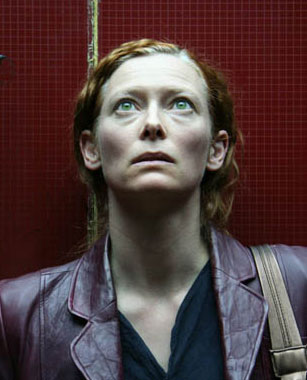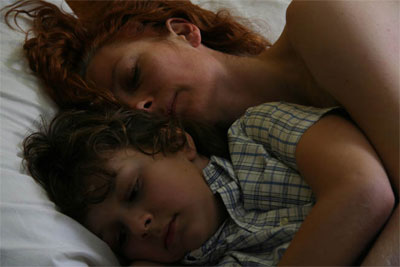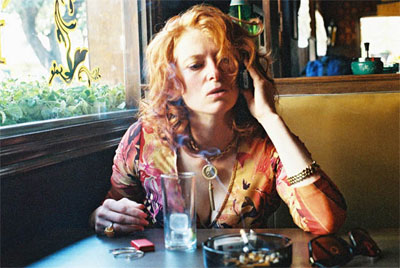Tilda Swinton Julia Interview

SWINTON MAKES AN INTENSE 'JULIA'.
EXCLUSIVE Tilda Swinton, Julia Interview by Paul FischerAcademy award winner Tilda Swinton can do anything, it seems, always playing women who are tough and fascinating, whether it is a white witch from Narnia or an obsessed, driven lawyer in Michael Clayton, for which she won her Oscar. Julia, an Indie thriller, is somewhat of a change of pace, as she gives a compelling performance as an alcoholic whose desperation reaches such heights that she resorts to kidnapping a little boy. Off screen, of course, the Scottish actress is far from some of these fearsome women. Warm, ferociously intellectual and very witty, Swinton is far more at ease at the independent film world than mainstream Hollywood, so winning an Oscar was certainly never on her radar. She talked to Paul Fischer in this exclusive interview.
QUESTION: Obviously this latest character in Julia must have really spoken to you. Why did you want to play such an intensely dark and difficult woman like this?
TILDA SWINTON: Do you know, honestly - I always - it has always occurred to me - I know so many people who are so like Julia and I've never really seen them on a screen before. We tend to see drunks portrayed as losers. There's a weak, dying fall to their energy, very often and for my money, that's not familiar in the energy of the glorious drunks I've known in my life. There's something so courageous, and hard-working, and fantasy-filled and fun, about most of the drunks I've known. I've always thought it would be wonderful to play - to make some type of homage to that energy and then when Erick Zonca, of all people, came to me with this project, I was so delighted, because if anybody could direct a woman like that, then it occurred to me that it was him. So, I was well aware of that kind of attitude that he has - that sort of compassion that he has with the people in his films that was so right for this story.
QUESTION: How hard is it for you to leave a woman like this behind at the end of the workday?
TILDA SWINTON: Oh, easy. You know, happy. Very happy. However chaotic one's own life might be, it's never going to be a patch on Julia's, so it was always quite a relief. Although - you know, I had to disguise myself pretty heavily as her. I had to sort of - you know, pull around. We had to work very fast. Of course, we didn't have enough money, as one never does with this sort of film and we had to shoot very fast, and very long hours. Also we were in Mexico City, which is a delight, but it's pretty hard core so it was kind of delightful going home afterwards.
 QUESTION: Now, is it a release for you to go from some of the mainstream Hollywood films that you have done recently, to something like this? I mean, is that the interest for you as an actor?
QUESTION: Now, is it a release for you to go from some of the mainstream Hollywood films that you have done recently, to something like this? I mean, is that the interest for you as an actor?TILDA SWINTON: Well, this is, let's face it, my kind of home base. This is my screensaver, this kind of film and this kind of world. The recent invitations that I've accepted to go and be at other people's parties, as it were, in the studio films that I've made -are the exceptions to the rule of my life. My life is generally spent making films like this, so, no, this is business as usual, really.
QUESTION: You seem to have your pick of playing these incredible women, when so many actresses, probably, of your age, seem to think that those roles don't exist - it seems to me the older you get, the richer the role. Why do you think that is, with you?
TILDA SWINTON: I really have no idea. I really don't know. I mean, you're right. I also do hear actresses of my age complaining about opportunities available to them. And I really feel for them. Particularly in light of the fact that - I don't know, maybe they should all go and live in Europe. [LAUGHTER] But, I mean, I think that - I've always known that women - particularly of this sort of age, are going to be endlessly fascinating, in terms of the cinema. I mean, I originally fell in love with the kind of women's cinema that came from the '40s and '50s, you know, that I used to go see when I was a child. I mean, all of these incredible stories, and incredible roles for women, informed my interest in cinema in the first place. I think it's a relatively recent thing, that we've stopped putting women centre screen. And I'm very optimistic that people will start doing it again, because that's what audiences really want.
QUESTION: I remember talking to you at Sundance about a month before the Oscar nominations were announced a few years ago, and you were quite convinced that would never happen. Can you talk about what that journey was like? It must have been very surreal, going through the awards season, walking that red carpet, and doing that whole thing. Was it kind of a weird experience for you?
TILDA SWINTON: It was - I mean, in many ways, it's weirder in retrospect, because at the time, I was absolutely happy to be aware in every sense of support - of support to that film, which I fully respect, in support of Tony Gilroy, who I love and think he's a really great filmmaker. And of course, George Clooney, who's a friend of mine, and whose performance in that film I thought was completely jaw-droppingly brilliant. I was so happy to be in support, literally, of that project, but I was always assuming that I was there as some kind of cheerleader, frankly and when we eventually got to go to the Oscars, and - I felt very much as if I was sort of sitting with a box of popcorn [LAUGHTER] in the observer's position. I said not long ago that it was a little bit like getting seats to centre court at Wimbledon, and then suddenly being handed a racket. I did not intend to be in the position that I was put into, so in retrospect, it's weird and a very strange sort of experience. When I hear of people talking about that kind of experience being something they've always dreamed about, something that they were hoping was going to happen to them, I feel a little shamefaced, because I cannot say that really, really I never intended to be in that position. And frankly, if you told me that was going to happen, I'm not sure I would have gone.
 QUESTION: Did the Oscar win change perceptions of you in America? I mean, did things - not that you need doors opening for you, because you're always working anyway. But, did things start to change in any dramatic way?
QUESTION: Did the Oscar win change perceptions of you in America? I mean, did things - not that you need doors opening for you, because you're always working anyway. But, did things start to change in any dramatic way?TILDA SWINTON: I don't really know whether I know the answer to that question. Partly because I've hardly been in America, since I've been here. And also, because pretty much everything I've done since then, I was going to do anyway. I mean, quite soon after that I went back to Europe, and I made an Italian film that I'd been working on for several years with a friend of mine. And I've been doing my film festival, and I've been working on my Foundation. So, I really - nothing has changed, as far as I'm concerned. Maybe my agents would tell you differently. As for perceptions,bI'm the last person to tell you anything about perceptions of me. You know, and I quite rightly stay out of that game.
QUESTION: What are you working on next, Tilda?
TILDA SWINTON: I'm developing a project with Lynne Ramsay. I don't know if you ever saw Ratcatcher or Morvern Callar. But she's an extremely talented Scottish filmmaker, and we've been developing a project for a while. And I hope we're gonna shoot it in New York. And meanwhile, what am I doing? Meanwhile, I am making another edition - I don't know if you know about my film festival, that I've started in Scotland, but I've started a series of ramshackle film festivals, which have rather been taking up my time, that the Scottish government - you should look on-line. Look up "Ballerina Ballroom Cinema of Dreams," and then look up about the film festivals that I started in Scotland. They're just little cinema film festivals in the village where I live. DVDs, all favourite DVDs, and they've become a bit of a sensation. So, I've been doing that.

Julia
Starring: Tilda Swinton, Saul Rubinek, Kate Del Castillo, Aidan Gould, Jude Ciccolella, Bruno Bichir, Horacio Garcia Rojas, Gaston Peterson, Mauricio Moreno, Kevin Kilner, John Bellucci, Ezra BuzzingtonDirector: Erick Zonca
Genre: Dramas
Julia, 40, is an alcoholic. She is a manipulative, unreliable, compulsive liar, all strung out beneath her still flamboyant exterior. Between shots of vodka and one-night stands, Julia gets by on... Julia, 40, is an alcoholic. She is a manipulative, unreliable, compulsive liar, all strung out beneath her still flamboyant exterior. Between shots of vodka and one-night stands, Julia gets by on nickel-and-dime jobs. Increasingly lonely, the only consideration she receives comes from her friend Mitch, who tries to help her. But she shrugs him off, as her alcohol-induced confusion daily reinforces her sense that life has dealt her a losing hand and that she is not to blame for the mess she has made of it.
Glimpsing imminent perdition, and after a chance encounter with Elena, a Mexican woman, Julia convinces herself -- as much in panic and despair as for financial gain -- to commit a violent act.
As the story unfolds, Julia's journey becomes a headlong flight on a collision course, but somehow she makes the choice of life over death.
MORE
- Mission: Impossible Fallout
- Glenn Close The Wife
- Allison Chhorn Stanley's Mouth Interview
- Benicio Del Toro Sicario: Day of the Soldado
- Dame Judi Dench Tea With The Dames
- Sandra Bullock Ocean's 8
- Chris Pratt Jurassic World: Fallen Kingdom
- Claudia Sangiorgi Dalimore and Michelle Grace...
- Rachel McAdams Disobedience Interview
- Sebastián Lelio and Alessandro Nivola...
- Perri Cummings Trench Interview



